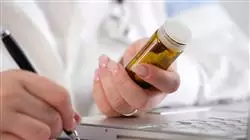University certificate
The world's largest faculty of psychology”
Introduction to the Program
This Postgraduate certificate covers all the current pharmacological knowledge along with the whole universe of expertise that psychologists need to be able to develop their role as psychotherapists in interaction and total coordination with doctors in order to, from there, improve the patient treatment”

21st century psychologists must be familiar with all the tools aimed at the biopsychosocial health of patients suffering from psychological disorders. Pharmaceuticals are one of these tools, and for this reason, psychologists must have a thorough knowledge of how they work in order to be able to adhere to their specialty, such as psychotherapy or group intervention.
Pharmacology studies the properties and actions that medication produces in organisms, making it a biological science. Any chemical substance that interacts in the living organism is called a pharmaceutical drug. In a more restricted sense, and as it will be considered in this Postgraduate certificate, a drug is any chemical substance used to prevent the appearance of an undesirable physiological process, or in the treatment, cure, prevention or diagnosis of a disease.
It becomes, therefore, a multidisciplinary field that admits professionals from molecular biologists to psychotherapists. In the context of psychologists' education in pharmacology, it offers a unique context to achieve the best of their expertise in practice with medicated patients. Pharmacology offers the possibility of knowing pharmacological drug actions and properties in such a way that they can be prescribed and applied to patients with rigor, with maximum safety, and in optimal conditions. The levels of knowledge may vary depending on the skills and requirements of each person and each profession related to pharmacological therapeutics.
Undoubtedly, the primary objective of Pharmacology is to benefit patients, and to do so as rationally and strictly as it is usually done to reach the correct diagnosis. This has led to an explosion in the production of therapeutically active pharmaceutical products, an accumulation of information that is not always easy to assimilate, and, above all, the possibility of rigorous, objective and individualized application to the characteristics of each patient.
Update your knowledge through this Postgraduate certificate in Medical History and Evaluation of Medicated Patients, in a practical way and adapted to your needs”
This Postgraduate certificate in Medical History and Evaluation of Medicated Patients contains the most complete and up-to-date educational program on the market. The most important features include:
- Clinical cases presented by experts in the different specialties
- The graphic, schematic, and practical contents with which they are created provide scientific and practical information on the disciplines that are essential for professional practice
- The latest diagnostic and therapeutic techniques in Medical History and Evaluation of Medicated Patients
- An algorithm-based interactive learning system for decision-making in the clinical situations presented throughout the course
- With special emphasis on evidence-based psychology and research methodologies in Psychology
- All of this will be complemented by theoretical lessons, questions to the expert, debate forums on controversial topics, and individual reflection assignments
- Content that is accessible from any fixed or portable device with an Internet connection
This Postgraduate certificate is the best investment you can make when choosing a refresher program, for two reasons: in addition to updating your knowledge in Medical History and Evaluation of Medicated Patients, you will obtain a qualification endorsed by TECH Global University"
Its teaching staff includes health professionals belonging to this field of knowledge of the Medical History and Evaluation of Medicated Patients, who bring their work experience to this program, in addition to recognized specialists belonging to leading scientific societies.a
The multimedia content developed with the latest educational technology will provide professionals with situated and contextual learning, i.e., a simulated environment that will provide an immersive program to learn in real situations.
The design of this program is based on Problem-Based Learning, by means of which doctors must try to solve the different professional practice situations that arise throughout the academic year. For this reason, they will be assisted by an innovative, interactive video system created by renowned and experienced experts in the field of Medical History and Evaluation of Medicated Patients with extensive teaching experience.
Take this program in Medical History and Evaluation of Medicated Patients and update your knowledge on the latest advances"

This Postgraduate certificate may be the best investment you can make when choosing a refresher course. What are you waiting for? Enroll now!"
Why study at TECH?
TECH is the world’s largest online university. With an impressive catalog of more than 14,000 university programs available in 11 languages, it is positioned as a leader in employability, with a 99% job placement rate. In addition, it relies on an enormous faculty of more than 6,000 professors of the highest international renown.

Study at the world's largest online university and guarantee your professional success. The future starts at TECH”
The world’s best online university according to FORBES
The prestigious Forbes magazine, specialized in business and finance, has highlighted TECH as “the world's best online university” This is what they have recently stated in an article in their digital edition in which they echo the success story of this institution, “thanks to the academic offer it provides, the selection of its teaching staff, and an innovative learning method aimed at educating the professionals of the future”
A revolutionary study method, a cutting-edge faculty and a practical focus: the key to TECH's success.
The most complete study plans on the university scene
TECH offers the most complete study plans on the university scene, with syllabuses that cover fundamental concepts and, at the same time, the main scientific advances in their specific scientific areas. In addition, these programs are continuously being updated to guarantee students the academic vanguard and the most in-demand professional skills. In this way, the university's qualifications provide its graduates with a significant advantage to propel their careers to success.
TECH offers the most comprehensive and intensive study plans on the current university scene.
A world-class teaching staff
TECH's teaching staff is made up of more than 6,000 professors with the highest international recognition. Professors, researchers and top executives of multinational companies, including Isaiah Covington, performance coach of the Boston Celtics; Magda Romanska, principal investigator at Harvard MetaLAB; Ignacio Wistumba, chairman of the department of translational molecular pathology at MD Anderson Cancer Center; and D.W. Pine, creative director of TIME magazine, among others.
Internationally renowned experts, specialized in different branches of Health, Technology, Communication and Business, form part of the TECH faculty.
A unique learning method
TECH is the first university to use Relearning in all its programs. It is the best online learning methodology, accredited with international teaching quality certifications, provided by prestigious educational agencies. In addition, this disruptive educational model is complemented with the “Case Method”, thereby setting up a unique online teaching strategy. Innovative teaching resources are also implemented, including detailed videos, infographics and interactive summaries.
TECH combines Relearning and the Case Method in all its university programs to guarantee excellent theoretical and practical learning, studying whenever and wherever you want.
The world's largest online university
TECH is the world’s largest online university. We are the largest educational institution, with the best and widest online educational catalog, one hundred percent online and covering the vast majority of areas of knowledge. We offer a large selection of our own degrees and accredited online undergraduate and postgraduate degrees. In total, more than 14,000 university degrees, in eleven different languages, make us the largest educational largest in the world.
TECH has the world's most extensive catalog of academic and official programs, available in more than 11 languages.
Google Premier Partner
The American technology giant has awarded TECH the Google Google Premier Partner badge. This award, which is only available to 3% of the world's companies, highlights the efficient, flexible and tailored experience that this university provides to students. The recognition as a Google Premier Partner not only accredits the maximum rigor, performance and investment in TECH's digital infrastructures, but also places this university as one of the world's leading technology companies.
Google has positioned TECH in the top 3% of the world's most important technology companies by awarding it its Google Premier Partner badge.
The official online university of the NBA
TECH is the official online university of the NBA. Thanks to our agreement with the biggest league in basketball, we offer our students exclusive university programs, as well as a wide variety of educational resources focused on the business of the league and other areas of the sports industry. Each program is made up of a uniquely designed syllabus and features exceptional guest hosts: professionals with a distinguished sports background who will offer their expertise on the most relevant topics.
TECH has been selected by the NBA, the world's top basketball league, as its official online university.
The top-rated university by its students
Students have positioned TECH as the world's top-rated university on the main review websites, with a highest rating of 4.9 out of 5, obtained from more than 1,000 reviews. These results consolidate TECH as the benchmark university institution at an international level, reflecting the excellence and positive impact of its educational model.” reflecting the excellence and positive impact of its educational model.”
TECH is the world’s top-rated university by its students.
Leaders in employability
TECH has managed to become the leading university in employability. 99% of its students obtain jobs in the academic field they have studied, within one year of completing any of the university's programs. A similar number achieve immediate career enhancement. All this thanks to a study methodology that bases its effectiveness on the acquisition of practical skills, which are absolutely necessary for professional development.
99% of TECH graduates find a job within a year of completing their studies.
Postgraduate Certificate in Anamnesis and Assessment of the Medicated Patient
The anamnesis and evaluation of the medicated patient is a crucial aspect in the field of Psychology, since it allows to detect the current clinical situation of the medicated patient in order to analyze its evolution and start, if necessary, a new and more effective treatment. Given its relevance to promote the recovery of the individual, the evaluative techniques have evolved significantly, forcing the psychologist to know them in order not to be left behind with respect to the advances in their sector. For this reason, TECH has created this Postgraduate Certificate in Anamnesis and Evaluation of the Medicated Patient, which will help you to be updated by the best experts in the field.
Study without uncomfortable schedules or time constraints.
Throughout the program, you will learn up-to-date techniques to perform a complete patient evaluation, including the identification of possible drug interactions and side effects. The Postgraduate Certificate in Anamnesis and Evaluation of the Medicated Patient is, therefore, an excellent option to improve your daily practice and your attention to people with different mental pathologies. Do not hesitate any longer and enroll in this program to grow professionally!







